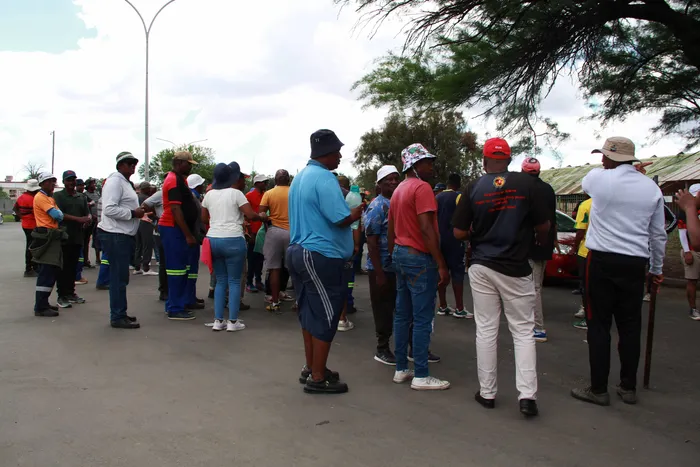Numsa heads to Labour Court over Ekapa Mine lay-offs

Numsa members have been protesting outside Ekapa Mine since last week.
Image: Sandi Kwon Hoo / DFA
THE NATIONAL Union of Mine Workers of South Africa (Numsa) intends to approach the Labour Court on an urgent basis after 387 workers were laid off in September at Ekapa Mine in Kimberley.
Numsa Kimberley local organiser Lila Nkosikhani said that of the total number of workers affected, 187 were Numsa members who were informed that they would be without work for 12 months.
“While the company is committed to employing them once the financial situation improves, there are no guarantees – and we have families without incomes,” said Nkosikhani.
He added that an application for the UIF’s Temporary Employer/Employee Relief Scheme (TERS) was not successful, and workers were not paid for October.
Nkosikhani stated that protest action would continue until the workers were reinstated. Roads leading to the mine were blockaded with bricks and rocks last week.
He further indicated that money deducted from workers during the Covid-19 pandemic, while the company was experiencing financial difficulties, was still outstanding.
Ekapa Mine general manager Howard Marsden stated on Friday that workers had embarked on an unprotected strike.
“Numsa and its members/affiliates’ illegal activities have disrupted operations and prevented employees from coming to work, which has resulted in substantial revenue losses,” said Marsden.
“Disciplinary action will be taken against the striking employees, and an urgent interdict has been lodged to ensure that SAPS responds appropriately and that Numsa stops with their illegal actions.”
He stressed that no worker had been dismissed.
“As an alternative to dismissal, we have embarked on a Temporary Employer/Employee Relief Scheme / Commission for Conciliation, Mediation and Arbitration (TERS/CCMA) application process, which was widely consulted with Numsa and Uasa trade unions, leading to an agreement being signed by both unions and the company to apply for TERS and adhere to its conditions.
“According to the CCMA, the TERS process takes 21 days to process, which leaves us hopeful that it will be approved and that the funds will be in time for the October pay run. Unfortunately, the CCMA requested additional information, which we are in the process of providing so that the CCMA can hear our TERS application as soon as possible.”
Marsden pointed out that workers could not be reinstated if they had not been dismissed.
He indicated that all outstanding Covid/TERS scheme payments had been paid to all employees
“The TERS/UIF scheme is an alternative to retrenchment and is valid for a maximum duration of 12 months. If our TERS application is approved, no retrenchments can take place for the duration of TERS and jobs will be saved. We are hopeful that our business recovers during this period and that the temporarily laid-off employees can return to work. This remains our intention.
“If we are successful and our application is approved, employees will be entitled to the amount as determined by the UIF. If the TERS application is not approved, we will then decide on our next steps in consultation with both unions,” Marsden added.